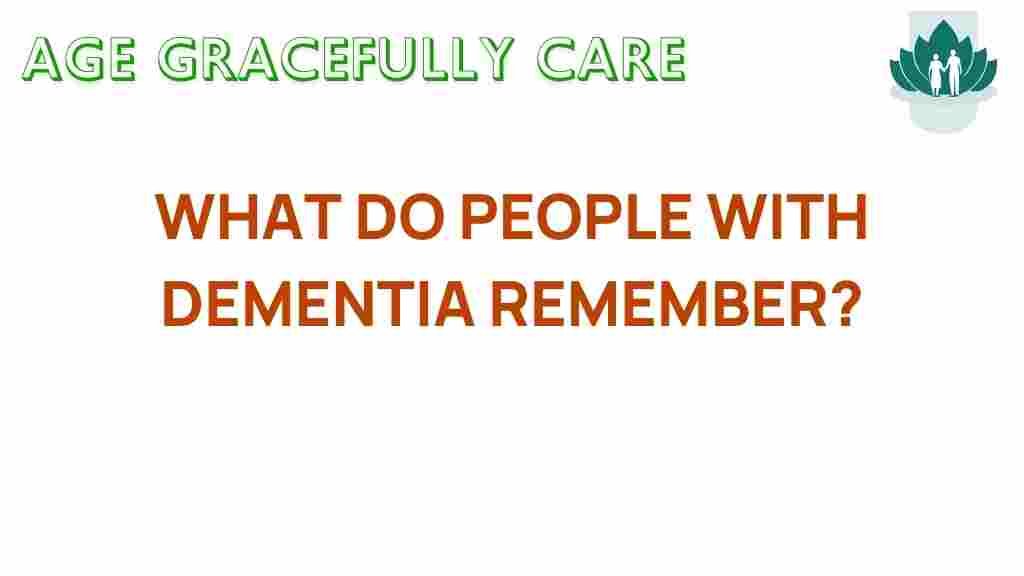Unlocking Memories: What Do People with Dementia Truly Recall?
Dementia is a complex condition that affects millions of individuals and their families worldwide. As cognitive decline progresses, understanding what people with dementia can recall becomes crucial for caregivers and loved ones. In this article, we will delve into the intricacies of memory recall in dementia, exploring emotional connections, personal stories, and the challenges faced by both those living with the condition and their caregivers.
The Nature of Memory in Dementia
Memory is not a single function; it involves various types and processes. In people with dementia, particularly Alzheimer’s disease, the brain undergoes significant changes that affect different aspects of memory. Here are some key points to understand:
- Short-term vs. Long-term Memory: Individuals with dementia often struggle with short-term memory, which impacts their ability to recall recent events or conversations. However, long-term memories, especially those from earlier in life, may remain intact for longer periods.
- Types of Recall: People with dementia may experience difficulties with explicit memory (conscious recall of information) while retaining some ability for implicit memory (skills and learned behaviors).
- Emotional Memory: Emotional connections tend to be preserved in dementia. Individuals often recall feelings and emotions associated with memories, even when the specific details may be lost.
The Role of Emotional Connections
Emotional connections play a significant role in memory recall for individuals with dementia. When caregivers and family members engage emotionally, it can trigger memories that are otherwise inaccessible. Here’s how emotional connections can enhance recall:
- Familiar Faces: Seeing loved ones can evoke strong emotional responses that may help trigger memories.
- Music and Smells: Certain songs or familiar scents can transport individuals back to specific times and places in their lives, enhancing recall.
- Storytelling: Sharing personal stories or engaging in conversations about past experiences can jog the memory and elicit responses.
Personal Stories: A Window into Memory Recall
Personal stories are powerful tools in understanding how individuals with dementia recall memories. Here are a few examples:
Mary, a 78-year-old woman living with Alzheimer’s, often struggles to remember what she had for breakfast. However, when her daughter plays a song from her wedding, Mary can hum along and share vivid details about that special day.
John, a former teacher, finds it hard to recall his students’ names. Yet, when he sees pictures from his teaching days, he lights up and begins to recount stories from his classroom, demonstrating that while names may be forgotten, the emotions tied to those experiences remain.
Understanding Cognitive Decline
Cognitive decline is a hallmark of dementia, and it manifests in various ways. Recognizing the signs can aid caregivers in providing better support:
- Memory Loss: Frequent forgetfulness, especially regarding recent events or conversations.
- Difficulty with Problem-Solving: Trouble following plans or managing finances.
- Language Issues: Struggles with finding words or following conversations.
Understanding these signs can help in creating environments that foster memory recall and emotional connections.
Effective Strategies for Encouraging Recall
As a caregiver, it’s essential to implement strategies that encourage memory recall. Here’s a step-by-step process to help:
- Create a Familiar Environment: Surround the person with familiar objects, photos, and mementos that can trigger memories.
- Engage in Conversations: Talk about past experiences, share stories, and reminisce together. Use open-ended questions to encourage responses.
- Utilize Music and Art: Play music from their youth or engage in creative activities like painting or drawing, which can evoke memories.
- Incorporate Routine: Establish daily routines that can provide structure and familiarity, making it easier for them to recall events.
- Practice Patience: Understand that memory recall may take time, and be patient. Celebrate small successes in memory recall.
Troubleshooting Tips for Caregivers
Even with the best strategies, there will be challenges. Here are some troubleshooting tips:
- Stay Calm: If the individual becomes frustrated, remain calm and reassure them. A soothing presence can help alleviate anxiety.
- Change the Approach: If a certain topic or method isn’t working, try a different approach. Switch to another memory trigger, such as a different photo or song.
- Involve Others: Sometimes, involving other family members can help. Different individuals may spark different memories.
- Seek Professional Help: If you’re struggling, consider reaching out to mental health professionals or support groups specializing in dementia care.
Conclusion
Understanding what people with dementia truly recall can unlock deeper emotional connections and enhance caregiving experiences. While cognitive decline presents challenges, employing strategies that honor emotional memories and personal stories can create meaningful interactions. Caregivers play a vital role in this journey, helping individuals with dementia navigate their memories and maintain their mental health.
For more resources on dementia caregiving and mental health, visit this page. Additionally, consider reading about personal stories and shared experiences on dementia forums available here.
In summary, unlocking memories in individuals with dementia is not just about recalling facts; it is about fostering connections and creating a supportive environment that honors their past, making every moment count.
This article is in the category Health and created by AgeGracefullyCare Team
